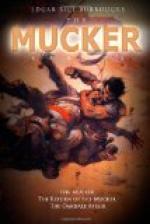Thus he strode through the turbulent, shallow river to clamber up the bank onto the island. In his soul the battle still raged, but he had by no means relinquished his intention to have his way with the girl. Fear, numb, freezing fear, was in the girl’s eyes now. The mucker read it there as plain as print, and had she not said that she was frightened? That was what he had wanted to accomplish back there upon the Halfmoon —to frighten her. He would have enjoyed the sight, but he had not been able to accomplish the thing. Now she not only showed that she was frightened—she had admitted it, and it gave the mucker no pleasure—on the contrary it made him unaccountably uncomfortable.
And then came the last straw—tears welled to those lovely eyes. A choking sob wracked the girl’s frame—“And just when I was learning to trust you so!” she cried.
They had reached the top of the bank, now, and the man, still holding her in his arms, stood upon a mat of jungle grass beneath a great tree. Slowly he lowered her to her feet. The madness of desire still gripped him; but now there was another force at work combating the evil that had predominated before.
Theriere’s words came back to him: “Good-bye, Byrne; take good care of Miss Harding,” and his admission to the Frenchman during that last conversation with the dying man: “—a week ago I guess I was a coward. Dere seems to be more’n one kind o’ nerve—I’m just a-learnin’ of the right kind, I guess.”
He had been standing with eyes upon the ground, his heavy hand still gripping the girl’s arm. He looked into her face again. She was waiting there, her great eyes upon his filled with fear and questioning, like a prisoner before the bar awaiting the sentence of her judge.
As the man looked at Barbara Harding standing there before him he saw her in a strange new light, and a sudden realization of the truth flashed upon him. He saw that he could not harm her now, or ever, for he loved her!
And with the awakening there came to Billy Byrne the withering, numbing knowledge that his love must forever be a hopeless one—that this girl of the aristocracy could never be for such as he.
Barbara Harding, still looking questioningly at him, saw the change that came across his countenance—she saw the swift pain that shot to the man’s eyes, and she wondered. His fingers released their grasp upon her arm. His hands fell limply to his sides.
“Don’t be afraid,” he said. “Please don’t be afraid o’ me. I couldn’t hurt youse if I tried.”
A deep sigh of relief broke from the girl’s lips—relief and joy; and she realized that its cause was as much that the man had proved true to the new estimate she had recently placed upon him as that the danger to herself had passed.
“Come,” said Billy Byrne, “we’d better move in a bit out o’ sight o’ de mainland, an’ look fer a place to make camp. I reckon we’d orter rest here for a few days till we git in shape ag’in. I know youse must be dead beat, an’ I sure am, all right, all right.”




